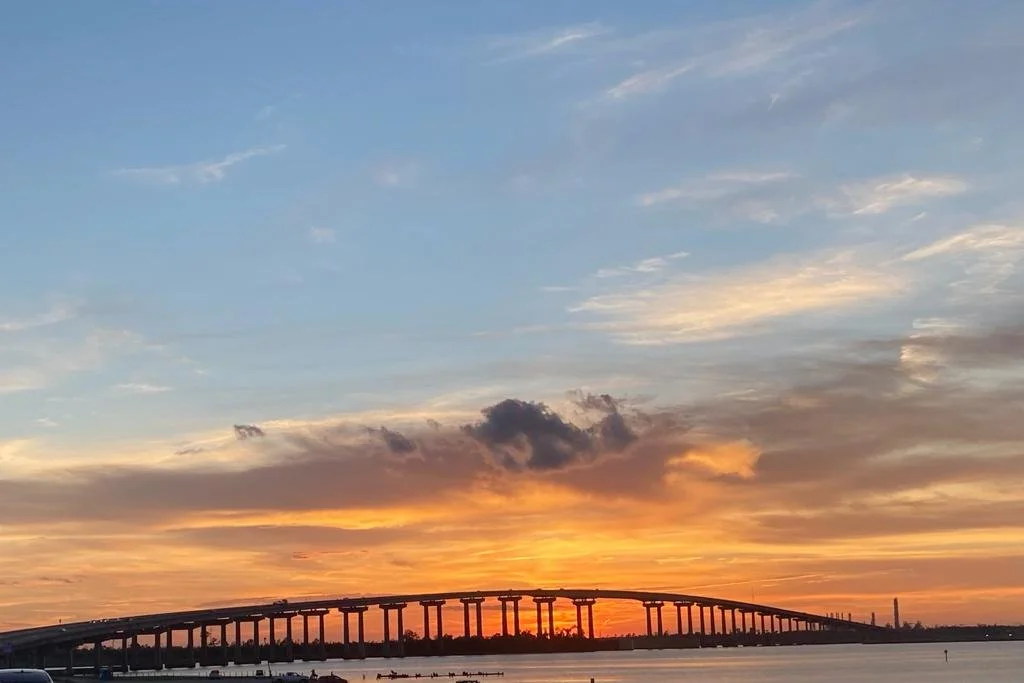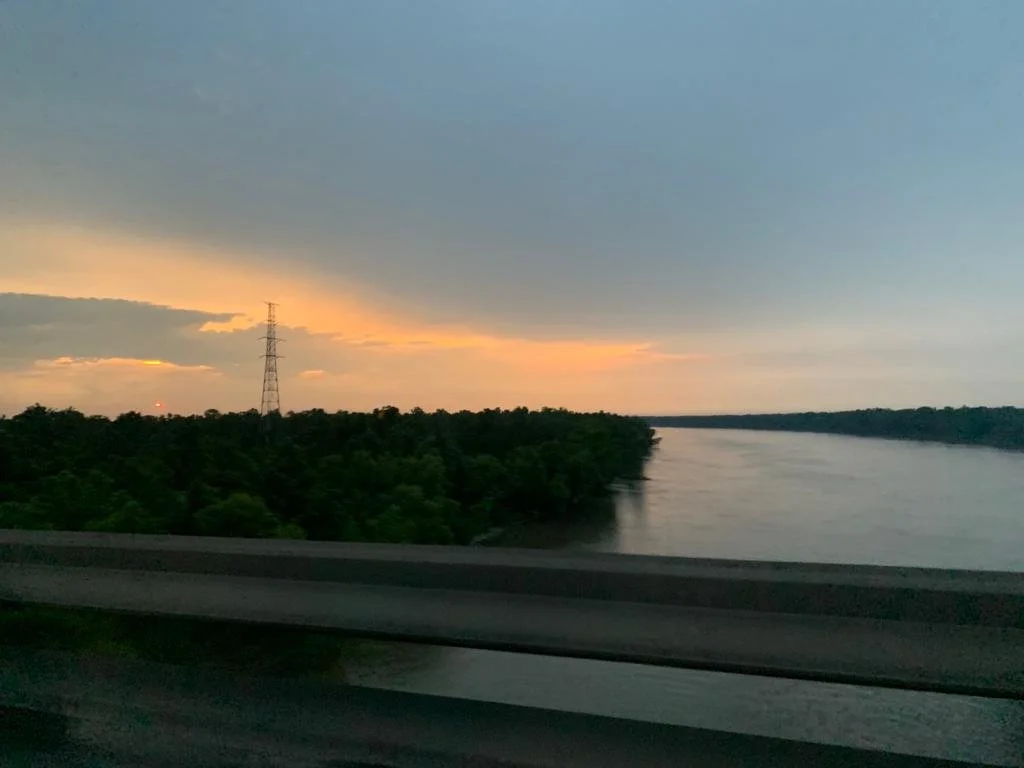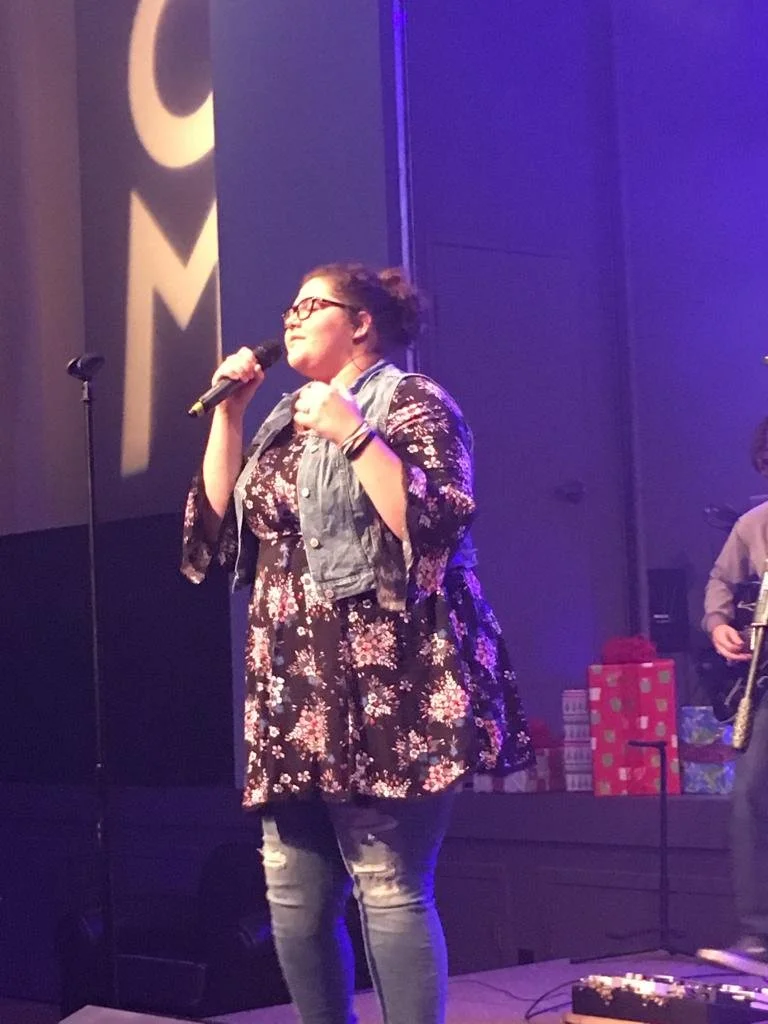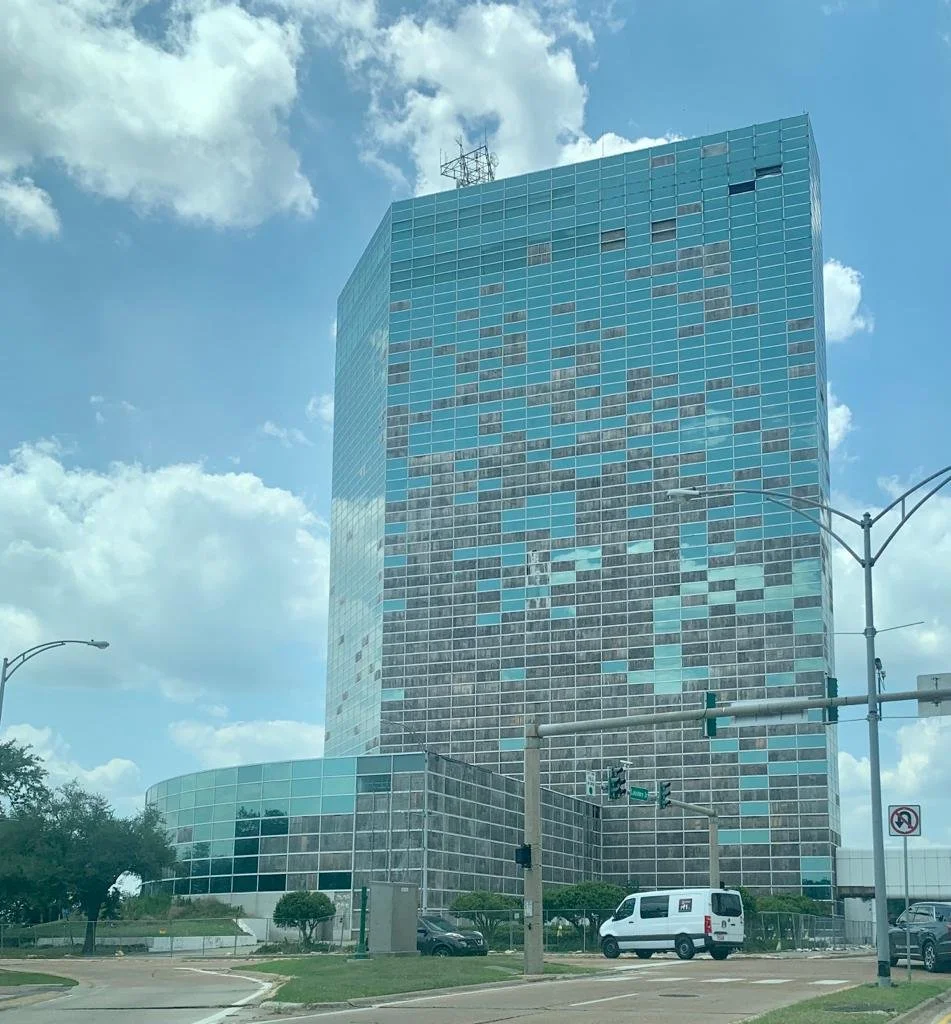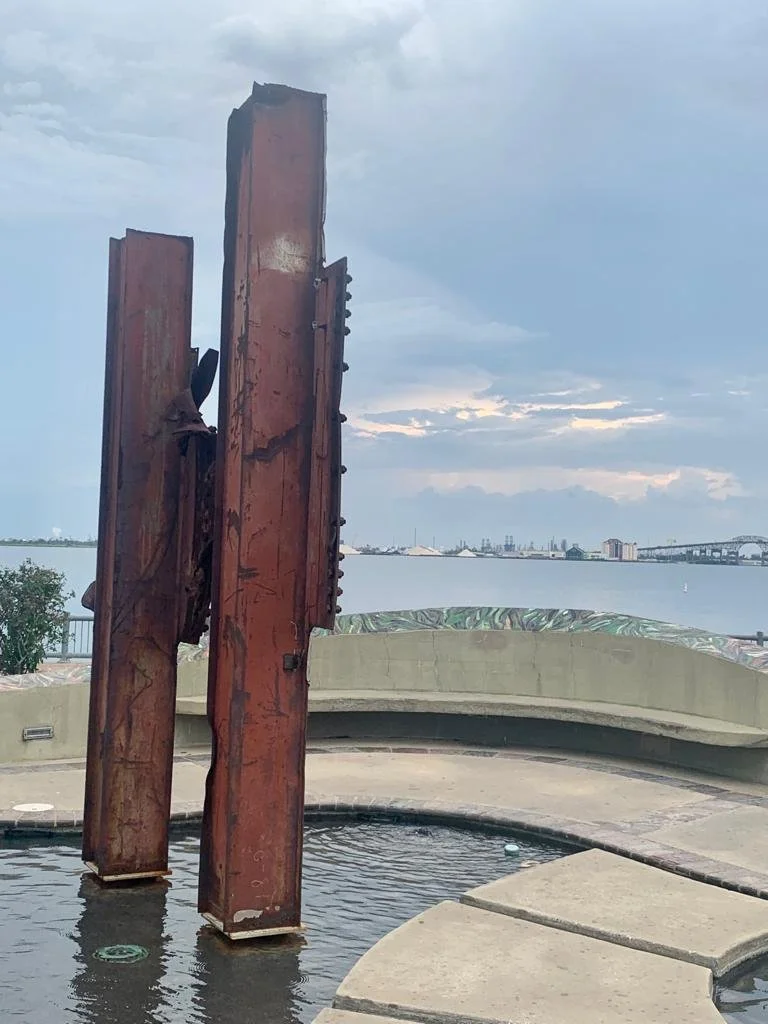By: Merisa Mattix
Sunset Over Calcasieu River driving into the city of Lake Charles (Photo: Hannah Adamson, Author’s Personal Collection).
Reflecting over the last few months has made it clear to me that the research I conducted last summer had a lot less to do with what I am academically interested in and more to do with hope for healing in my community. I am a white, cisgender, bisexual, American Christian woman from Arizona raised in a conservative Baptist church. I spent my childhood through my teens deeply involved in my church, including participating in Bible memorization competitions and serving on the worship team. When I moved across the country and started to build my own life, I discovered my queer identity, and the joy of a diverse and inclusive environment and adjusted my educational path to support my new political views. Unfortunately, this has come with an increasing distance between myself and the traditional Christian communities that raised me. This divide has felt deeper since the start of the COVID-19 pandemic, continued to grow with the rise of the Black Lives Matter Movement and the 2020 election cycle, and felt devastatingly wide as I watched the January 6th, 2021 insurrection. I felt isolated because the community that raised me believed differently on these issues, and I saw the extreme of these disagreements in the violence.
Merisa Mattix (author) leading worship at a Christian non-denominational church in 2018 (Photo: Unnamed, Author’s Personal Collection).
This division goes beyond me and has been in the American political environment over the last 50 years. (Cohan, 2019; Howe, 2019; Kaufman, 2002). Since about the 1970s, many surveys show that the far ends of America’s political spectrum have grown apart, and there is less and less room for a middle ground in political discourse (NW et al., 2014). Many issues at the forefront of the debate are again on the table. These include LGBTQIA+ Rights, Abortion Legalization, and Civil Rights movements (now primarily Black Lives Matter).
I hypothesize that addressing division within the Christian church in the United States may help to address the polarization we see throughout the country. One voice consistently centered in American political discourse is that of the Christian Church (referring to the entire community of Christians). This is still true, with many politicians and lobbyists citing their religious views as reasoning for their political standpoints and arguments (Guth & Smidt, 2022). With the majority of the United States (over 65%) and the vast majority of politicians identifying as Christian, arguments with religious considerations have salience (Past Findings, n.d., et al., 2014). In this way, by healing political division in one of the largest demographics in the country, we can make a large step toward the healing of the country as a whole.
To test my assumptions and understand if those in the Christian community see this divide, I designed a study to be conducted in Lake Charles, Louisiana, where I have some previous connections and knowledge of the political sphere. Lake Charles was an ideal location for this research as over 80% of the population identifies as Christian and gives a perspective from the Deep South, which is especially polarized (Lake Charles, LA Metropolitan Statistical Area, n.d.). Lake Charles’s tense history with governments through trading of land between France, Spain, and the US also adds context to a more conservative mindset, favoring small government and more libertarian policies (“No Man’s Land,” 2019). This case has the potential to offer insight into other communities across the country with similarities.
Downtown Lake Charles Capital One building July 2022, damaged by Hurricane Laura in 2020. (Photo: Merisa Mattix, Author’s Personal Collection).
I conducted eight (8) semi-structured qualitative interviews with five (5) participants recruited from a prominently conservative Christian congregation and three (3) from a prominently progressive Christian congregation. These interviews focused on participants’ (a) definition and perspective of political polarization in the country, (b) experience of political polarization within their community, and (c) recommendations for addressing political polarization.
Coming out of the study and after doing data analysis, I discovered a few disagreements from these communities on the definition of political polarization and how we, American Christians, can address division. Many of the definitions are similar and often include language that alludes to violence (i.e., trenches, fight, battle). Overall, political polarization was described as two sides without a middle ground, and these sides are unwilling to speak with each other. When asked which political issues are most polarizing in their communities, participants mentioned the following most often to least often: abortion legalization, gun control, LGBTQIA+ rights, and climate change policy.
Participants also offered recommendations for addressing the division in their communities. They recommended actions that I then put into the categories of education, empathy, and active listening. Education includes voter education through churches, and possibilities of hosting candidates or debates at churches for the congregation to learn their policies. Empathy and Active Listening covered recommended skills needed for productive conversation across disagreement. Empathy recommendations include: rehumanizing the “other,” and aiming to understand someone’s circumstances before arguing. Active listening is listening to understand rather than to respond. Rather succinctly, one participant (a middle-aged white woman) said one should “listen twice as often as we shout at each other.”
In addition to these interviews, I conducted an autoethnographic study in which I recorded my own observations and reflections on the church services I attended, interviews I conducted, and overall experiences living in Lake Charles for the summer with community members. Throughout my autoethnography, I recorded the general tension in my own mind. Recording my reactions was most helpful as I attended services that I knew would not support my beliefs but were still essential at services that I aligned with more. I also reflected before and after interviews, especially exploring what sensitive issues were brought up and how they were discussed.
An essential part of the autoethnographic study included my feelings as I entered into faith traditions that hurt me in my past. This research was extremely difficult for me and brought trauma to light that I was unaware of. By conducting this study and discussing my motivations for the study following interviews, I found that I am not alone in my hurt or hope for a better United States. Although it was more difficult than I imagined, it showed how vital work to heal the division between the church has become. By the end of my time in Lake Charles, I had more hope for ending polarization in the US and within the American Church. In conversations with interviewees during and around interviews, I discovered intentions to create more modes of exchange.
Reflecting on my time in Lake Charles after having time away has left me with a few key lessons:
Many on all sides are concerned about the state of polarization within the United States.
Hurt from the division is not an isolated experience.
Often, hatred is not as present as a lack of understanding.
The majority of congregants are acting with good intentions.
There is a desire for respectful dialogue and training on how to do this.
9/11 Memorial in Lake Charles, the I-10 bridge, and several petrochemical plants can be seen across the lake (Photo: Merisa Mattix, Author’s Personal Collection).
Using this study, I have presented at several research conferences to distribute the knowledge I have gained to the conflict resolution and mediation fields. In the coming months, I hope to create a dialogue program to distribute to churches and Christian groups and be available as an open-source resource through the MHCR website. Using this study, the recommendations and lessons from my participants, and general best practices for facilitating and holding dialogue, I will outline how to breach polarizing subjects in dialogue. This training document would encourage open, brave, and vulnerable conversations on polarized political issues and explain how these would be best facilitated and organized. If successful, many communities could start to heal the divide I and many others feel with these dialogues.
God loves you because that is who God is.
I know God loves you because I do,
And I know God loves me because you love me.
If we remember that we will not only survive,
We will save the world.
(Kevin Garcia, 2021)
References:
Guth, J. L., & Smidt, C. E. (2022). The Partisanship of Protestant Clergy in the 2016 Presidential Election. Politics and Religion, 15(2), 291–316. https://doi.org/10.1017/S1755048321000262
Lake Charles city, Louisiana—Census Bureau Profile. (n.d.). Retrieved June 28, 2022, from https://data.census.gov/cedsci/profile?g=1600000US2241155
Lake Charles, LA Metropolitan Statistical Area. (n.d.). 1.
McTague, J., & Pearson‐Merkowitz, S. (2013). Voting from the Pew: The Effect of Senators’ Religious Identities on Partisan Polarization in the U.S. Senate. Legislative Studies Quarterly, 38(3), 405–430. https://doi.org/10.1111/lsq.12020
No Man’s Land. (2019, February 5). Louisianalife.Com. https://www.louisianalife.com/no-mans-land/
NW, 1615 L. St, Washington, S. 800, & Inquiries, D. 20036 U.-419-4300 | M.-857-8562 | F.-419-4372 | M. (2014, June 12). Political Polarization in the American Public. Pew Research Center - U.S. Politics & Policy. https://www.pewresearch.org/politics/2014/06/12/political-polarization-in-the-american-public/
Semler. (2021). The Blessing By Kevin Garcia. PK Records. https://open.spotify.com/track/4lzIvKBvmqpZVwt5vlqV1f?si=3964233b9c884bf9
The 2020 Census of American Religion. (n.d.). PRRI. Retrieved July 29, 2022, from https://www.prri.org/research/2020-census-of-american-religion/
U.S. Census Bureau QuickFacts: Lake Charles city, Louisiana. (n.d.). Retrieved June 28, 2022, from https://www.census.gov/quickfacts/fact/table/lakecharlescitylouisiana/PST045221
